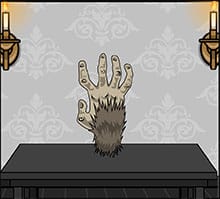 A curse is an expression through which harm is wished upon a person or a group of individuals. The term comes from the Latin word maledictio , which can be translated as "injury."
A curse is an expression through which harm is wished upon a person or a group of individuals. The term comes from the Latin word maledictio , which can be translated as "injury."
He who curses is longing for something bad to happen to another. Generally it is a saying that is made in a moment of anger or displeasure, without the subject expressing the curse doing anything so that the evil is actually carried out.
However, there are those who believe in the magical power of words and think that uttering the curse is enough for the recipient to suffer misfortune . In this framework, curses can be considered part of superstitions .
Sometimes it is indicated that the curse falls on an object or a place . A cursed house , to cite one case, is a construction that, according to this belief, causes suffering to its inhabitants. The curse can be executed through spirits , demons, or other supernatural creatures.
These types of curses are common in the field of fiction . The story "The Monkey's Paw" by WW Jacobs , for example, revolves around a talisman (the monkey's paw of the title) that is cursed: it grants three wishes, but at the same time generates great suffering.
In this case, the curse is understood as a kind of "price to pay" for access to the power of the talisman. It is a way to achieve balance in the presence of an artifact that can threaten to destroy it for all of humanity. In the famous cartoon series The Simpsons , this story has been the center of one of its "Halloween" episodes.
Just like Jacobs's monkey's paw, there are many stories in which curses are directly related to certain objects. One of the most popular poems by Nikos Kavvadías speaks of a piece of iron that leads those who find it to suffer different misfortunes , to the point of forcing them to murder a loved one with it.
 According to African American voodoo beliefs, to harm someone it is possible to place cursed objects in their path that activate when they pass over them. On the other hand, we have cursed or haunted houses and hotels, which generate a degree of fascination that is impossible to contain in lovers of the supernatural .
According to African American voodoo beliefs, to harm someone it is possible to place cursed objects in their path that activate when they pass over them. On the other hand, we have cursed or haunted houses and hotels, which generate a degree of fascination that is impossible to contain in lovers of the supernatural .
Damn, finally, can be used as an interjection to pronounce displeasure , anger or reproach : «Damn! The bank is already closed, we'll have to come back tomorrow," "I can't believe you did something so idiotic. Curse! Now we'll have to see how we solve this problem , " "Damn! "I cut myself with the knife."
It is important to note that this interjection is not common in all Spanish-speaking regions, nor is it used by people of all ages and sectors of society. In these situations, the little ones usually resort to sounds and moans; adolescents and young people, to phrases considered " vulgar "; the elderly, to expressions such as this, which are usually called corny by the previous ones.
In this context, the term curse is also defined as "a word or phrase that we can use to show our anger" in the face of a situation that causes us displeasure or frustration. This is a concept that is also called "insult", although they are not exactly the same: when our computer breaks down, or the car runs out of fuel in the middle of the road, for example, we usually say rude things, which are not We would repeat it in front of our bosses, teachers or even in the presence of our parents.
